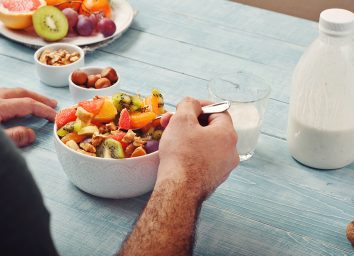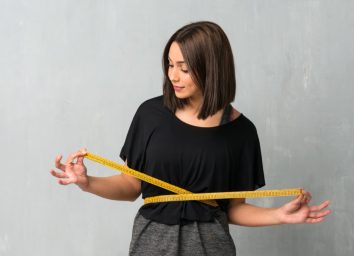Eating Habits to Avoid for a Lean Body After 40, Say Experts
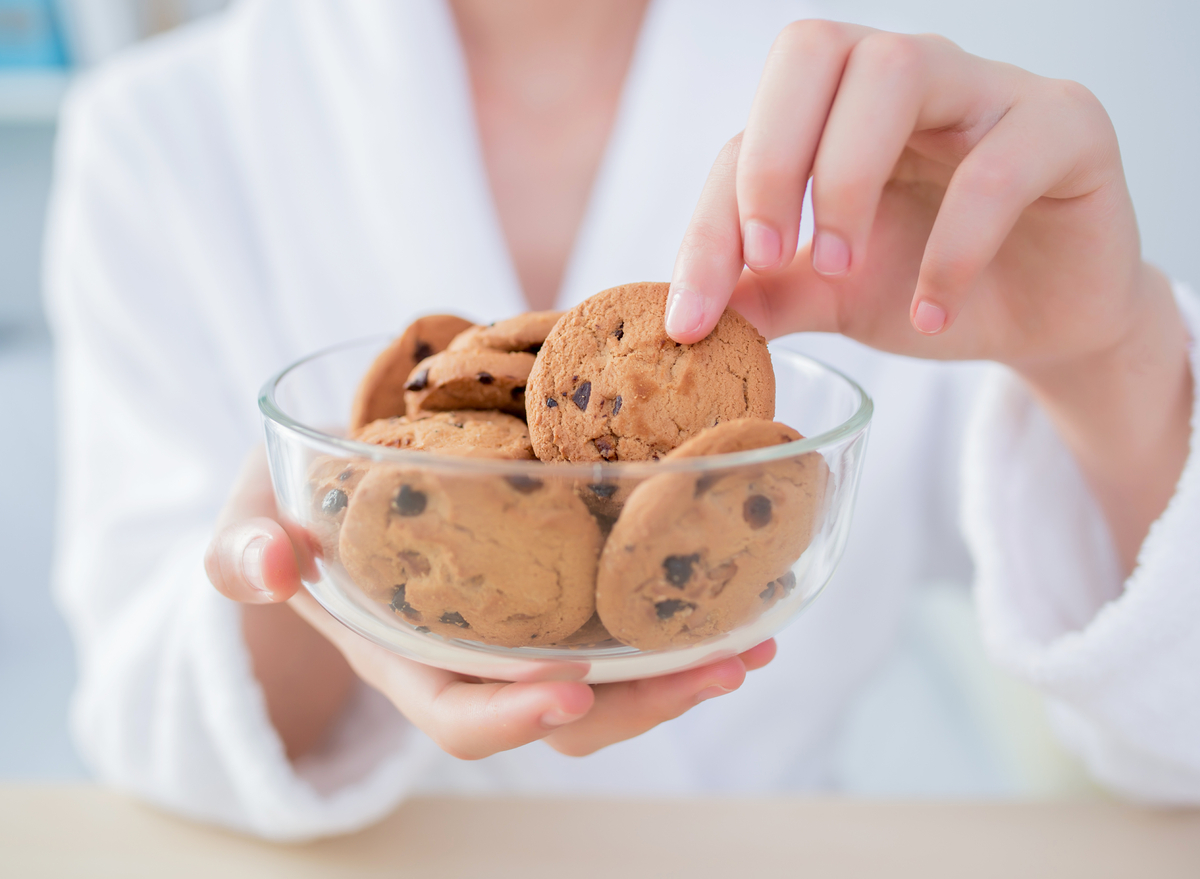
If you're 40 or thereabouts, your life is probably pretty busy. You're at the peak of your career. If you have kids, they are eating up a ton of your time. Maybe you're not exercising as much ask you'd like to because of the above. And maybe you're still entrenched in those eating habits you established in your late 20s and 30s.
Your 40s are the perfect time to assess your lifestyle and health. Have you put on a few pounds? That's pretty common for the 40-something. As we age, many of us move less, lose muscle mass, and often consume as much if not more than we did when we were younger, says Liz Weinandy, MPH, RDN, a registered dietitian nutritionist at The Ohio State University Wexner Medical Center in Columbus. "If you are over 40 and have started to put on some pounds, rethink your total calorie needs," she says. "It changes as our lives change."
Overlooking how your calorie needs change as you age isn't the only reason why you may not be able to maintain a lean body. There are many eating habits you once had that now pack on the pounds as your body has changed. Avoid these eating habits that registered dietitians say pack on the calories that are keeping you from achieving that lean body at 40+, and for more on how to eat healthy, make sure you learn of these Breakfast Habits to Avoid If You Want to Lose Visceral Fat, Say Dietitians.
Avoid the habit of late-night eating.

Aim to eat the bulk of your calories during the daytime hours. "If you are seeing your blood sugar trend upwards, eat fewer carbs at night and move them to the morning and early afternoon when your body can handle them better," suggests Weinandy. "Research is showing that late-night eating is really not good for us."
Avoid the habit of drinking every night.

"It's easy to grab a glass of wine or a beer after a long day especially when dealing with the added pressures of life that come in our 40's," says registered holistic nutritionist Pamela Barton, founder of Butterfly Holistic Nutrition + Lifestyle. "However, our bodies process alcohol less efficiently as we get so regular drinking will increase fat stores and can contribute to a fatty liver."
Avoid the habit of yo-yo dieting.
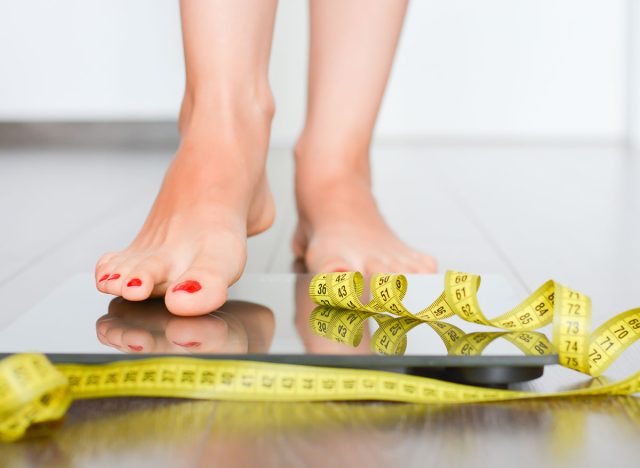
Weight gain in our 40s is often followed by drastic attempts to lose it by severely restricting calories, which is nearly impossible to sustain, or eating unsatisfying "diet" meals, which can lead to binge eating later on. Trying to lose weight fast usually fails and exerts an emotional toll on the dieter. "Repeated attempts to lose weight can be more harmful than just remaining at a higher weight," says registered dietitian nutritionist Laura Krauza, MS, LDN, of Waistline Dietitian. "Studies have reinforced the connection between dieting to lose weight and weight cycling and suggest that yo-yo dieting most strongly predicts future weight gain."
Avoid the habit of mindless eating.
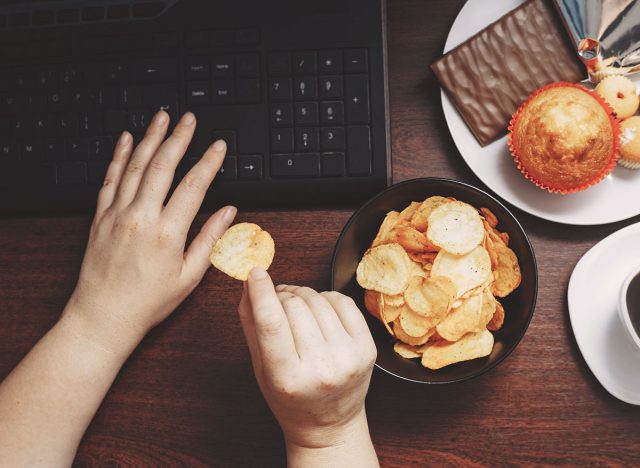
In other words, avoid unpredictable, haphazard, unplanned eating that results from not being on a relatively regular eating schedule that works with your body's natural circadian rhythms. Spur-of-the-moment eating "confuses the body, triggers unwelcome blood sugar fluctuations, throws your hunger hormones out of whack, and disrupts sleep," says Isa Kujawski, MPH, RDN, a functional mind-body nutritionist and owner of Mea Nutrition LLC.
Avoid the refined flour and sugar habit.

For most women over age 40, simple carbohydrates become harder to process and use without being stored as fat. But we like our refined flour products and sugary snacks and beverages. "If you like carbs, switch to more complex carbohydrates, such as sweet potatoes, whole oats, brown rice, and quinoa," suggests Krauza. Pay attention to nutrition facts and ingredients labels. "Skip the breads and baked goods as much as you can," says Krauza. "Highly processed, refined foods are typically calorically dense with relatively low nutrient density and contain a host of ingredients that may be foreign to the body and not only detrimental to your waistline, but to your overall health," adds Kujawski.
Avoid the habit of an all-day eating window.

Keeping a food log not only illustrates what you're swallowing but when. If you keep track of everything you eat, you may find that you're eating meals and snacking throughout the day and your "eating window" has grown to maybe even 16 hours. "Studies have shown that in order to remain lean and avoid blood sugar imbalances—which contribute to belly fat—intermittent fasting and other time-restricted eating strategies can support a healthy body weight," says Barton. A new study found the #1 Best Fasting Schedule for Quicker Weight Loss.
Read these next:
- 40 Drinks You Should Never Drink After 40
- Best Foods That Boost Your Memory After 40, Say Dietitians
- 40 Ways to Stay Healthy After 40, Say Experts

